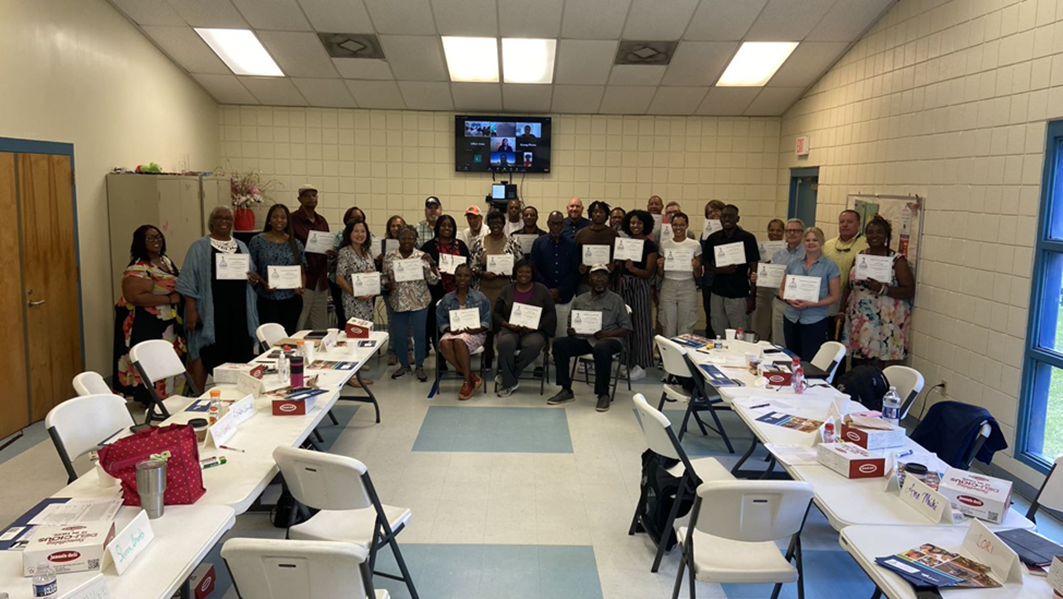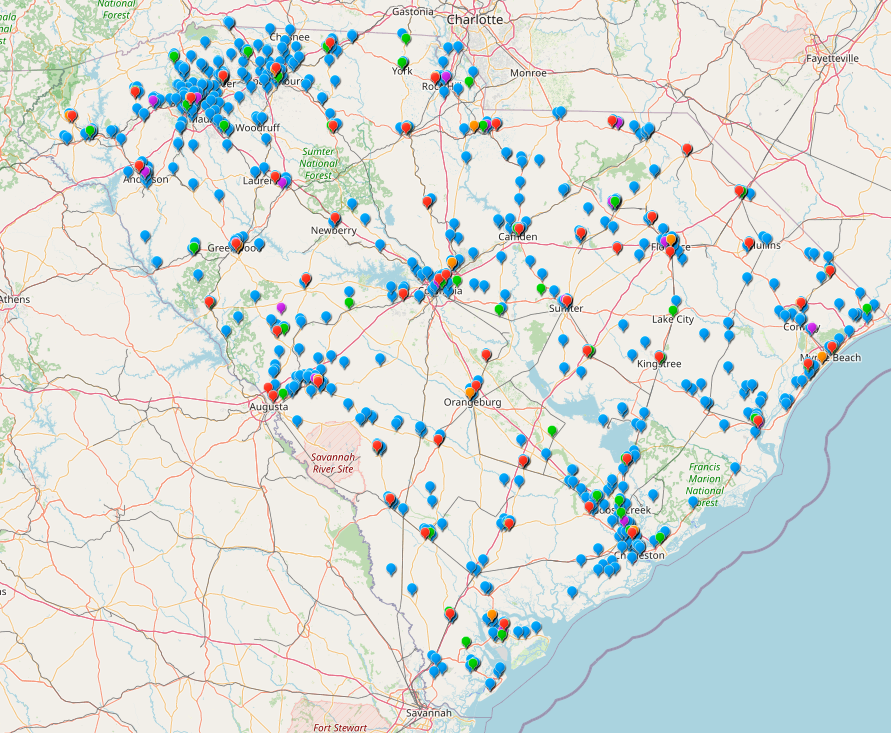Overview
In October of 2020, DHEC was selected as a recipient of a U.S. Environmental Protection Agency (EPA) grant for environmental justice projects that benefit low-income and minority communities in South Carolina.
Through the State Environmental Justice Cooperative Agreement Program, EPA is providing grants over a two-year period to work collaboratively with environmental justice communities to understand, promote and integrate approaches that provide meaningful and measurable improvements to public health and the environment.
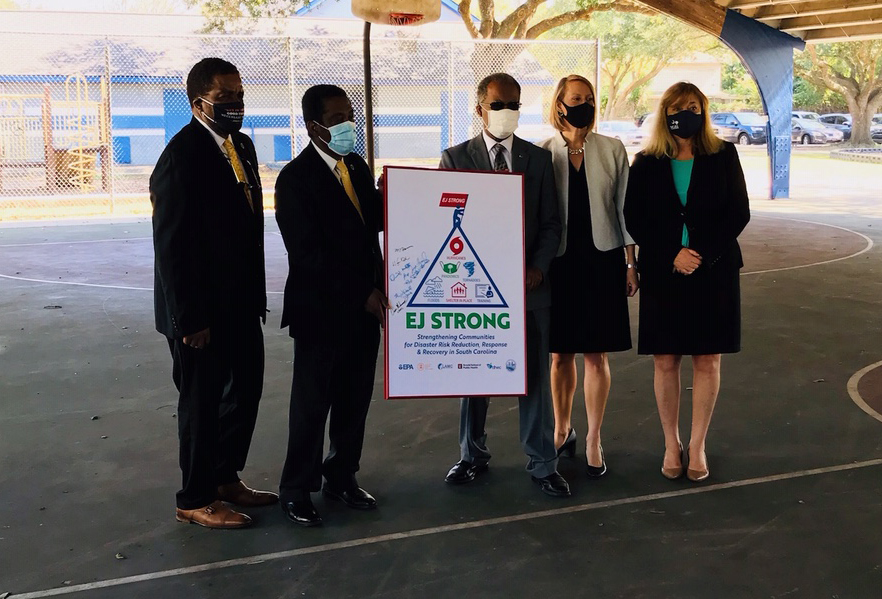
DHEC will use its $200,000 grant to develop a Community-Managed Disaster Risk Reduction (CMDRR) training program
in eight underserved communities in the North Charleston area that will help these neighborhoods better prepare
for, respond to, and recover from disasters like hurricanes, flooding, chemical releases and pandemics.
Participants from the eight selected neighborhoods -- Accabee, Chicora/Cherokee, Union Heights, Howard Heights, Windsor Place, Five Mile, Rosemont, and Liberty Hill -- as well as other EJ communities throughout the state, will attend in-person and virtual training sessions centered on disaster preparation and recovery. Participants will complete assignments that demonstrate their training in how to best address various scenarios caused during emergencies, including unhealthy home conditions, food insecurities, and energy or weatherization issues. Community disaster drills and exercises will also be part of the CMDRR training program. The program has been dubbed "EJ Strong."
EJ Strong Workshops
The four, free-of-cost trainings will be for 2-days each. The 4th training will be a Train-the-Trainer Workshop. All 2-day trainings will be held on a Friday - Saturday combination. Participation in the series is free but requires a firm commitment to attend all the sessions. Enrollment is limited to help foster an interactive learning experience.
Our partners: U.S. Environmental Protection Agency, Lowcountry Alliance for Model Communities, Clemson: College of Behavioral, Social and Health Sciences, College of Charleston: Center for Coastal Environmental & Human Health, U of SC: Arnold School of Public Health.
Roughly 30 community leaders who live or work in overburdened communities within South Carolina participated in the first EJ Strong workshop on June 25 and 26. "Environmental Justice (EJ) Strong: Strengthening Communities for Disaster Risk Reduction, Response, & Recovery in SC" is an innovative, hands-on training currently being used in the Philippines and other areas where natural disasters take place often. This Community-Managed Disaster Risk Reduction program is the first time this training is being offered in the USA. A total of 4 free workshops will be held. SC DHEC; EPA; LAMC, a non-profit organization in North Charleston; U of SC; College of Charleston; and Clemson are collaborating partners for these trainings.

EJ Strong conducted Workshop #2 “Strengthening Communities for Disaster Risk Reduction, Response, and Recovery in South Carolina” in April 2022. Partners and participants such as DHEC, Lowcountry Alliance for Model Communities (LAMC), U of SC, College of Charleston, and the SC Office of Resilience met in North Charleston to discuss disaster planning and prevention of disaster-related health impacts. Community Planning was essential in the workshop as smaller teams worked to identify Participatory Learning & Action tools (PLA) and implement community-managed disaster risk reduction plans. Participants of Workshop #2 were able to discuss healthy homes and flood cleanup with presenter Michael Goldschmidt of USDA/HUB National Healthy Homes. Mary Reynolds of EPA Region 4 also presented information on mold, moisture control, mold prevention, and mold cleanup.
Food and Nutrition Security were also central topics in the workshop. Dr. Florence Anoruo, professor at SC State University and US EPA/ USDA Science Advisory Board Appointee, presented the importance of food security, the lack of food access within the Orangeburg community, and resources that are available for all communities. Dr. Leslie Hossfeld, Dean of Clemson University’s College of Behavioral, Social Science & Health Sciences, discussed Food and Nutrition Security and presented a case study highlighting Mississippi’s Delta Fresh and Food Initiative on equitable food and farming systems and sustainable community relationships.
As part of the EJ Strong project, Clemson University has created a FOOD MAP for the entire state of SC! Locations of food pantries, farmers' markets, United Way Offices, etc. are part of this resource.
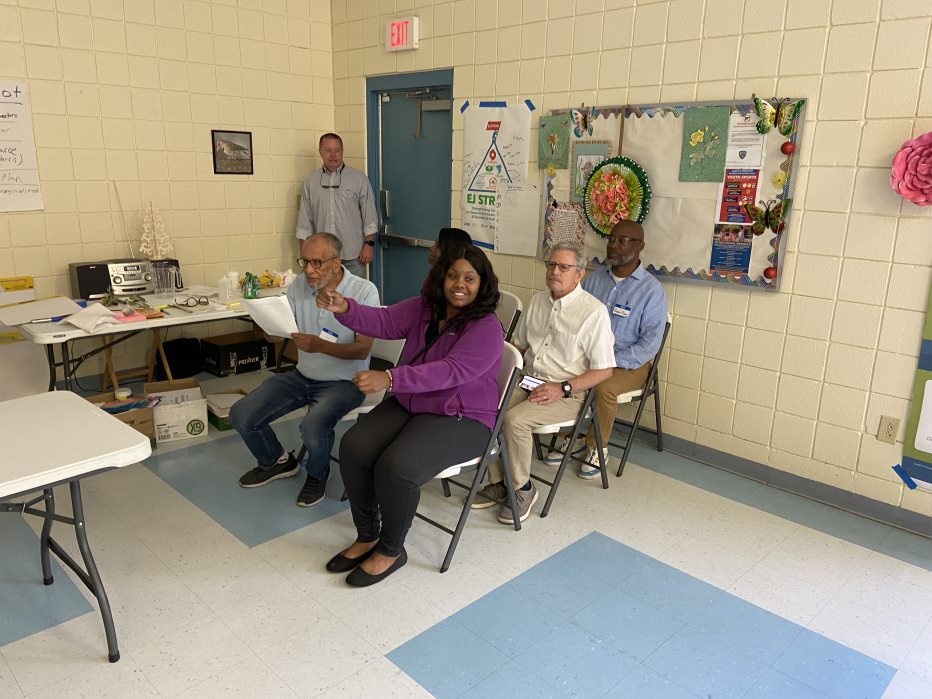
EJ Strong continued with a Field Practicum July 22nd and 23rd in the Rosemont Community in Charleston, South Carolina. Using the EJ Strong Field Practicum Guide, EJ Strong members partnered with the Community of Rosemont to discuss the environmental impacts in their neighborhood. Community members welcomed EJ Strong to a tour of Rosemont, enlightening to the team their history and start of environmental burdens. Nancy C. Button, President of the Rosemont Neighborhood Council, and Community Member Herbert Maybank voiced their concerns about excessive flooding, pollution, property deterioration, and residents suffering from respiratory issues and cancer from past chemical releases. The team viewed the sound wall, a barrier between the Rosemont Community and Interstate- 26. Residents believe that the sound wall is the cause of excessive flooding the community has been experiencing. Marshes also surround Rosemont, which have led to concerns about sewage and legacy pollution. EJ Strong and members of Rosemont worked together on Community Managed Disaster Risk Reduction by completing the Participatory Disaster Risk Assessment which combines the information gathered for the vulnerability, capacity, and hazard assessments.
Lowcountry Alliance for Model Communities (LAMC), Arnold School of Public Health at the University of South Carolina, and the Medical University of South Carolina has partnered with the Rosemont Community on environmental surveillance. EJ Strong viewed an air monitoring system recently installed in the neighborhood to track air pollutants and water level monitors which will be used to alert residents to flooding in the area.
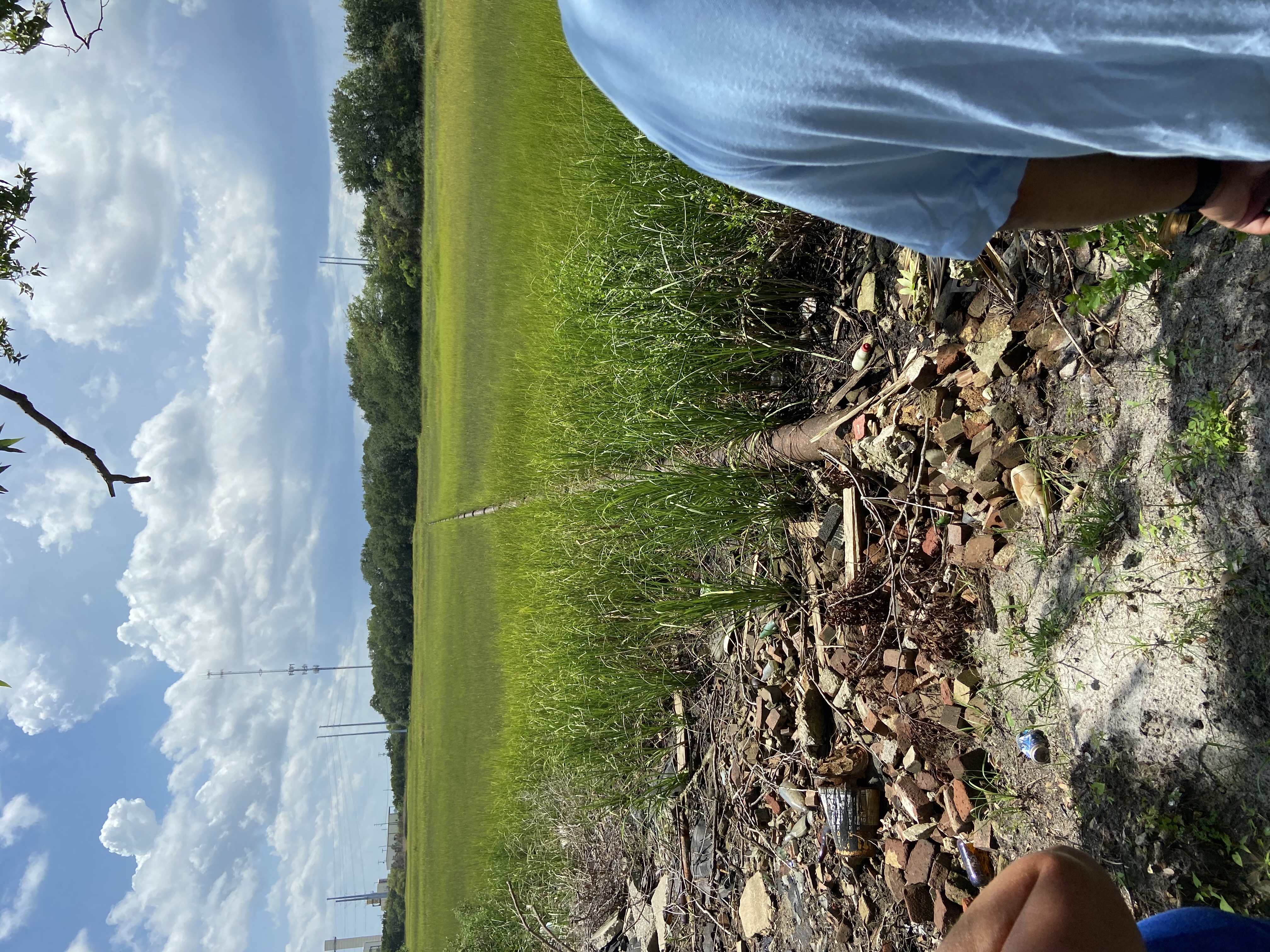
As part of the EJ Strong project, Clemson University has created a FOOD ACCESS MAP for the entire state of SC! Locations of food pantries, farmers' markets, United Way Offices, DHEC locations, and South Carolina Department of Social Services offices throughout the state are part of this resource.
The FOOD ACCESS MAP is a detailed, extensive resource, but it is by no means complete. It will remain a work in progress as more sites are added and the resource is kept up to date. Any agencies not currently represented on the map that would like to provide their information for inclusion should email foodaccessmap@clemson.edu.
EJ Strong partnered with the Community of Lower Richland to host the EJ Strong Field Practicum. Residents of Hopkins, South Carolina, Robert Reese, and Sheila Kimble represented the Lower Richland Community by actively planning the field practicum with the EJ Strong Team. This was the first workshop for the Lower Richland community. Groups focused on the primary concerns of flooding, toxic releases, and wildfire hazards. Residents of the Lower Richland Community also voiced concerns about the long-term adverse effects of the 1000-year flood that occurred in October 2015. Together, the EJ Strong Team and the Lower Richland Community worked on community-managed disaster risk reduction (CMDRR) assessments that examined the hazards, vulnerabilities, and capabilities to mitigate future disasters.
The Community of Lower Richland is in the lower region of Richland County. Surrounded by the Congaree River and Wateree River which create the Santee River, the community is known for its enriched agriculture and phenomenal water ecosystems. Consequently, flooding is a reoccurring issue, as rain events settle and accumulate throughout Lower Richland. The community, although rural, is heavily industrialized and hosts the Syvalmo Eastover Mill, Westinghouse, and the International Process Plants and Equipment Corp. Industrial entities can create high vulnerability in Hopkins, Gadsden, Eastover, and East Columbia due to potential toxic releases and wildfire exposure. Flooding, toxic releases, and wildfires are primary hazards within the Lower Richland Community that have produced legacy pollution and negatively impacted wildlife and the environment.
During the field practicum, Richland One Board Chairwoman Cheryl Harris discussed the devastating 1,000-year flood in October 2015. The Lower Richland Community was severely affected as residents faced massive flooding, deterioration of property, closure of roads, lack of shelter, and last-minute evacuations. Seven years later, the community is still recovering from the long-term effects of this disaster. Mitigation solutions for future emergencies include establishing a community response team and providing resident training on disaster prevention and safety. Early warning systems, evacuation shelters, and an evacuation plan are recommended for residents to plan and evacuate safely before a disaster occurs. The community relies heavily on their churches as recovery hubs and Fort Jackson National Guard as the first response – strengthening community engagement with local members, state agencies, and other stakeholders can build capacity for emergency response.
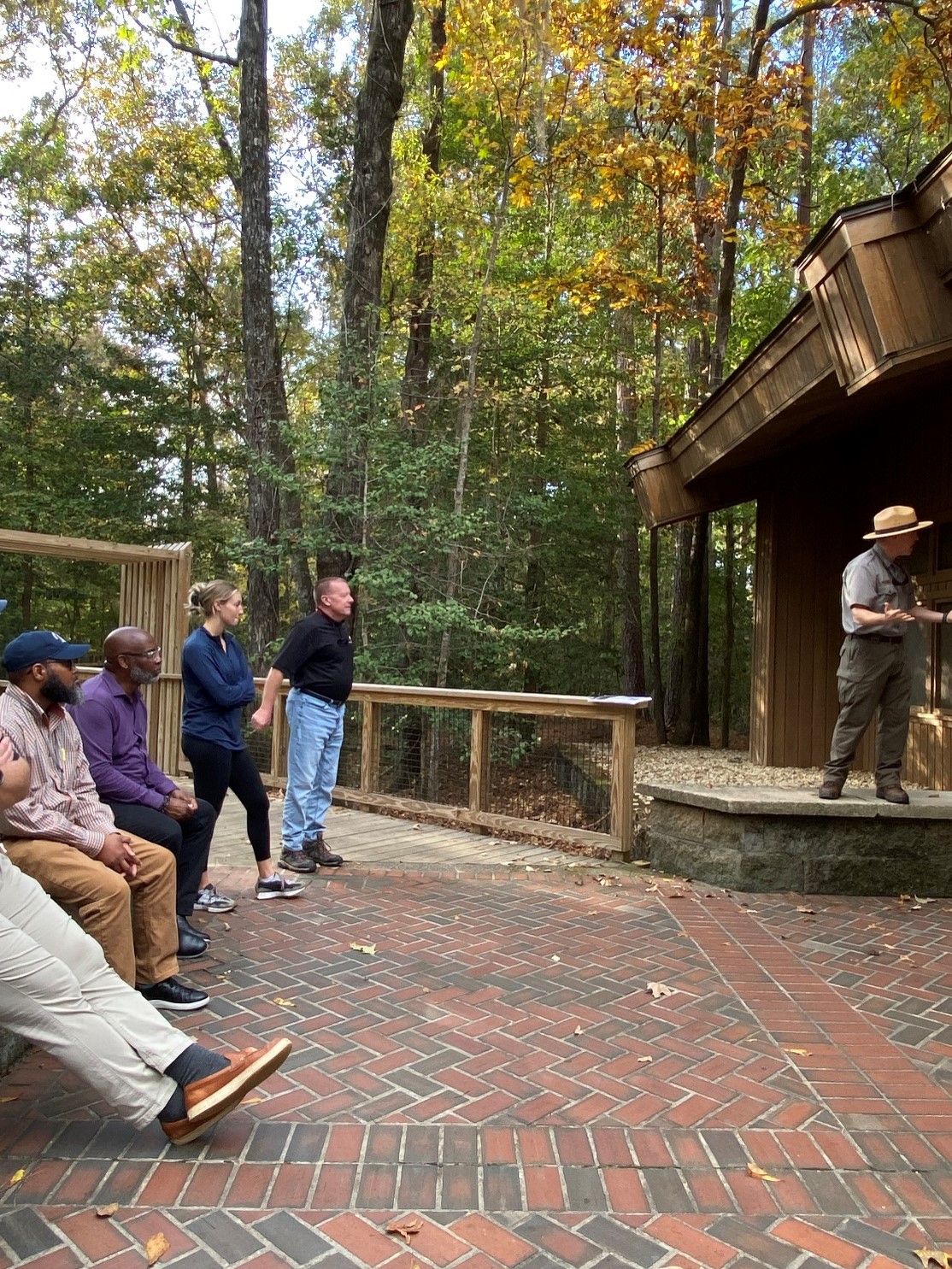
In February 2023, the EJ Strong Team, community leaders, and Lower Richland (LR) Community members gathered for an action plan meeting. After the success of the LR Field Practicum, the team wanted to come back together to recap disaster-related issues discussed by residents and begin the planning stages to address such concerns. The EJ team discussed potential future goals and visions among prominent leaders of the community, such as South Carolina's House Member Dr. Jermaine Johnson, School Board Commissioner and Chairwoman Cheryl Harris, County Council Board Member Cheryl English, President of Hopkins Community Awareness E.C. Nelson, and Richland County CERT (Community Emergency Response Team) Program Manager, Sharon Long.
Lower Richland Community Leaders, Mr. Robert Reese and Reverend Sheila Kimble reviewed the Lower Richland Field Practicum Report. This included a recap of the community-managed disaster risk reduction (CMDRR) assessments to examine the community's hazards, vulnerabilities, and capacities which led to the creation of the final participatory disaster risk assessment (PDRA). Findings were presented in the report:
- According to the latest American Community Survey, Lower Richland's population is at a 98% medium vulnerability and 2% high vulnerability regarding flooding. The Elderly population within Lower Richland is the most vulnerable. Planning should be considered for older adults and their caregivers, those with functional needs (mobility or intellectual disabilities), those with transportation needs (wheelchair or oxygen tanks), and pet owners.
- 80-90% of the Lower Richland Area is considered a wildfire risk with potential sources being industrial storage, flammable chemical transportation, and recreational activities. 6,904 homes, 6 schools, 18 essential businesses, 52 churches, 5 nursing homes, 3,293 elders, and 784 children in the Lower Richland Community are at high risk for wildfires.
- Industries in Lower Richland pose significant risks among the community, especially during times of natural events such as earthquakes, flooding, and hurricanes. Major industrial sites in Lower Richland can expose 2,116 residents, 874 homes, and 24 places of worship to a toxic release.
During the action plan meeting, The EJ Team and community members collaboratively voted on vision statements and goals to help build capacity in the Lower Richland Community. Subgroups were created among attendees to work simultaneously on the main objectives of flooding, wildfires, and toxic releases.
Vision Statement
Our vision is for governmental, volunteer, and private organizations, with effective plans, necessary resources, and training for variable and efficient disaster response. To maintain and improve the capability to successfully work together to mitigate against, prepare for, respond to, and recover from all-hazards-related emergencies and disasters.
Goal Statements
- To build capacity to address disaster risks that catapult the efforts of the community to address other important concerns.
- To collaborate, coordinate, and communicate with Lower Richland and across the larger county for disaster relief/planning initiatives.
Objectives
Team Flood: To create and implement a monitoring and early warning system by
February 2024
Team Toxic: Identify at least one emergency shelter/resilience hub in LR
that can be a center of operations by February 2024
Team Wildfire: Emergency Response System to be in operation by February
2024
EJ Strong Workshop #3, "Strengthening Communities for Disaster Risk Reduction, Response, and Recovery in South Carolina," was held in North Charleston in March 2023. Dr. Daniel Kilpatrick, a core leader of the EJ Strong Team, facilitated discussions and exercises on early warning systems (EWS) and community simulations & drills for preparedness. Early warning systems are essential for community readiness during emergencies. Practicing Preparedness Drills helps the community be more robust and resilient before, during, and after a disaster. Community, city, or state contingency plans should thoroughly consider and include both components.
During workshop #3, Community Leader Robert Reese presented the Lower Richland Field Practicum and Action Plan Report. Mr. Reese described the process and collaborative work of EJ Strong, Lower Richland Residents, and various stakeholders during the field practicum and action plan meeting. The group is currently working to achieve the community's objectives of installing monitoring and early warning systems, establishing a shelter or resilience hub, and forming a response team by February 2024. Lowcountry Alliance for Model Communities’ (LAMC) Executive Director, Omar Muhammad, presented the Rosemont Field Practicum Report which summarized Rosemont's environmental struggles, field practicum outcomes, and actions towards achieving capacity. Since the Rosemont Field Practicum in July 2022, the Rosemont Community has received $400,000 in grant funds from the National Fish and Wildlife Foundation, The National Oceanic and Atmospheric Administration, and Charleston City Council. The Rosemont Field Practicum Report created by the EJ Team and Rosemont Members will be included in the City of Charleston and the City of North Charleston's Resiliency Plan.
Brooke A. Brittain of Clemson University presented updates on the Clemson Food Access Map, and Stacey Washington from the SC Energy Office talked about weatherization & energy efficiency of homes. The U.S. EPA Environmental Justice Coordinator, Daphne Wilson, also facilitated a discussion on the Collaborate Problem Solving Model and upcoming EJ grant opportunities. A special segment of the workshop was to present Mr. Omar Muhmmad with DHEC's Community Star Award for his prestigious and ongoing work with EJ communities – Congratulations Omar!
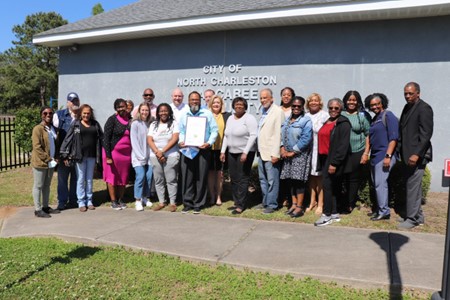
The fourth workshop of the EJ Strong Program, called "Train the Trainer," took place in North Charleston, South Carolina. The workshop objectives were to help participants become trainers in their respective communities on disaster risk reduction, community resilience and environmental efforts. The workshop was facilitated by the EJ Strong Advisory Group, which included various organizations such as South Carolina's Department of Health and Environmental Control (SCDHEC), Low Country Alliance for Modeled Communities (LAMC), The University of South Carolina – Arnold School of Public Health (UofSC), College of Charleston: Center for Coastal Environmental & Human Health (CofC), and Clemson University: College of Behavioral, Social and Health Sciences. Additionally, the residents of the Lower Richland Community and the Neighborhood of Rosemont were actively involved in the Train the Trainer workshop as collaborators. Other organizations, such as Sustaining Way (Greenville, SC), the Imani Group (Aiken, SC), the Center for Sustainable Communities (Atlanta, GA), and the Pee Dee Indian Tribe (McColl, SC), also participated in the workshop to review the material learned from previous EJ Workshops and Field Practicums.
The first day of the Train the Trainer workshop included three modules for review:
Module One: Disaster Risk Reduction - This module covered terms associated with disaster risk reduction, including hazards, disasters, capacities, vulnerabilities and resilience. It also reviewed disaster mitigation approaches, such as Disaster Management and Disaster Risk Reduction.
Module Two: Participatory Learning & Action (PLA) Tools - This module focused on PLA tools used for identifying needs, planning, monitoring, or evaluating projects and programs among communities. Various PLA tools were discussed, such as Ranking/Scoring (to identify and compare community priorities), Timeline (to gain insights into past hazards/events), Mapping (to map local hazards), and Trend Analysis (to identify past hazards and trends). The module also reviewed disaster risk assessments used by EJ Strong in the Lower Richland and Rosemont Communities. These assessments included hazard assessments, vulnerability assessments, capacity assessments and disaster risk analysis.
Module Three: Community-Managed Early Warning Systems - This module covered the four components of community-managed early warning systems: knowledge of risks and hazards, monitoring and warning procedures, dissemination and communication, and response and capacity.
On the second day of the workshop, community impacts of the EJ Strong Program were discussed. Representatives from the Lower Richland Community, including Shelia Kimble and Robert Reese, highlighted their continuous partnership with EJ Strong. They mentioned their efforts toward establishing a neighborhood council to advocate for environmental efforts, the development of a community water monitoring group, and the establishment of a shelter during disasters. Representatives from Rosemont Neighborhood Council, including Nancy Button and Rosemont Resident Henry Maybank, also discussed their achievements in reaching resiliency as a historic community. Efforts for the Rosemont Community included visualizing elevation changes around the soundwall; creating Story Maps on the community's responses to the Charleston Seawall and its environmental impact; and developing the Rosemont Field Practicum Report, which is included in the City of Charleston's Water Plan. Additionally, updates were provided on the Food Access Map by Dr. John Cooper from Clemson University and the development of the EJ Strong app, which was presented by Garry Harris, the president of the Center for Sustainable Communities, and the Georgia Institute of Technology.
At the end of Train the Trainer, participants received certificates for Community-Managed Risk Reduction to acknowledge their completion of the workshop. The workshop aimed to equip these trainers with the necessary knowledge and tools to further enhance community resilience and disaster risk reduction efforts in their respective regions.
